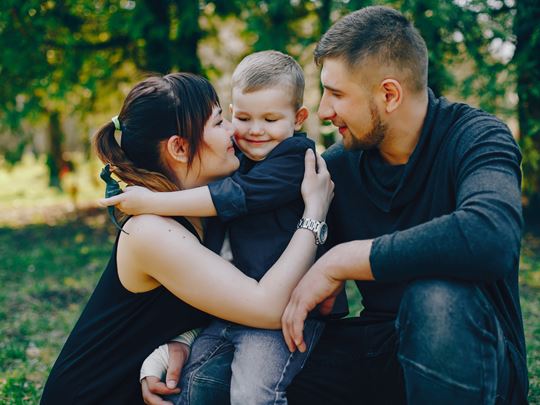
Why do foster parents attend meetings?
Although foster parents provide the most hands-on care, it still takes a village to raise a child. Foster care meetings help every professional involved in a child's care understand how a child is getting on in the foster home, at school, and during family time arrangements.
They are a chance to raise concerns, share successes, and make any changes needed to better support the child. They also help you access extra support, whether that’s training, guidance, or specialist services.
While the idea of regular meetings might feel a little daunting at first, fostering is all about teamwork, and with the right support around you, both you and the child in your care can thrive.
What types of meetings do foster parents attend?
As a foster parent, you’ll attend various meetings. Each meeting has a clear purpose, and different professionals will attend depending on the type of meeting. Some happen every month, while others every six months, and some may only take place if there is an issue or concern. Here is a breakdown of foster care meetings in more detail.
Placement Planning Meetings
How often is the meeting held?
A placement planning meeting is held within 72 hours of a child moving into your home.
Who will attend?
Foster parents and your supervising social worker, the child's local authority (LA) social worker, and the child depending on their age. Sometimes, other professionals, such as the child’s teacher, may attend.
What is the purpose of the meeting?
During a placement planning meeting, attendees will discuss and agree on the child's placement plan. This helps everyone involved in the child's care to understand their needs and ensures that both you and the child have the support required to meet them.
Examples of details discussed in a placement planning meeting include:
- Why is the child in care?
- What is their legal status, and who has parental responsibility?
- How long is the placement expected to last?
- How is the child's physical, emotional, and mental well-being? This includes their medical history, health conditions, medication, and allergies.
- What are the child's emotional and behavioural needs?
- Does the child have any specific identity needs? For example, cultural, religious, or language.
- Which school does the child attend, and when is their Personal Education Plan (PEP) meeting scheduled?
- Who has delegated authority for particular decisions?
- What will their daily routines look like? For example, mealtimes and bedtimes.
- What family time arrangements are in place? Including frequency, venue, transport, and who will supervise.
- What support will the child and foster parent need, and when will they receive it? For example, how often will the child's social worker visit?
Looked After Child (LAC) Reviews
How often is the meeting held?
A Looked After Child (LAC) review, which is sometimes known as a Child Looked After (CLA) review, will take place within the first month of a child being in your care, again 3 months later, and then every 6 months after that.
Who will attend?
LAC reviews are led by an independent reviewing officer (IRO) who is independent of the child's social work team within the local authority. Foster parents and your supervising social worker, the child's LA social worker, and sometimes the child will attend. Other professionals involved in the child's care, such as a psychologist, teacher, or health professional, may also join the meeting.
What is the purpose of the meeting?
The purpose of LAC reviews is to gain an overview of how a child is progressing in their foster home. The IRO will assess the child's overall well-being and circumstances, taking the child’s views into account by speaking to them alone, either before or after the meeting.
During LAC meetings, the IRO will review and update the child's care plan to ensure it continues to meet the child's needs. Discussions may include:
- The child's overall well-being and progress.
- How they are getting on at school.
- Their physical, mental, and emotional health.
- How family time arrangements are going - are they positive, and do they need reviewing?
- Any changes to the child's circumstances, and future planning.
- Whether the child's current foster home is meeting their needs.
- Whether the child needs any additional support.
Personal Education Plan (PEP) Meetings
How often is the meeting held?
Personal Education Plan (PEP) meetings are held every term but may happen more frequently if the child in your care needs more support. The first PEP meeting will take place within the first month of a child moving into care.
Who will attend?
PEP meetings are usually led by the child's designated teacher or a member of the SENCO team. The virtual school head, foster parents, your supervising social worker, the child’s LA social worker, and sometimes the child will attend, along with other relevant professionals involved in the child’s care.
What is the purpose of the meeting?
PEP meetings focus on the child’s education. They help everyone involved in the child’s care understand how they’re doing at school and identify whether they would benefit from any additional support. Details covered during a PEP meeting may include:
- The child's attendance record.
- Feedback from teachers.
- Academic achievements and concerns.
- Identifying any additional support needed from the SENCO team.
- Listening to the child’s views to understand how they feel about school.
- Reviewing how Pupil Premium funding is being used to support the child, such as for art therapy or additional tutoring.
- Support the child will receive if they're transitioning from primary to secondary school or moving to a school in a different area.
Supervision Meetings
How often is the meeting held?
Supervision meetings take place once a month or more often if needed. You’ll also have two unannounced visits per year.
Who will attend?
Your supervising social worker will visit you and the child in your care at home. If you’re fostering as a couple and the secondary foster parent is unable to attend supervision every month, they must attend at least once every three months.
What is the purpose of the meeting?
Supervision meetings give your supervising social worker (SSW) insight into how things are going within the foster home. They ensure that both you and the child in your care receive the support you need.
If you're fostering with children of your own, your supervising social worker will also check in with them and make sure they feel happy and settled within the foster home too.
During your first supervision meeting, your SSW will:
- Ask you how you found your assessment and panel.
- Discuss foster care training in more detail.
- Talk to you about your Training, Support, and Development (TSD) Standards workbook.
- Let you know what you can expect from future supervisions.
- Deliver basic CHARMS training.
- Spend time getting to know you and your family.
- Discuss initial matching and welcoming your first child – including asking whether your foster parent profile is up to date, if you’ve created a welcome book and whether you’ve had contact with the referrals team.
When a child is in your care, you'll have a supervision meeting with your supervising social worker once a month. During these meetings, you'll have the opportunity to raise any concerns you have about the child in your care, ask for advice and guidance, and receive feedback about how you're progressing in your role.
Your supervising social worker will also discuss upcoming meetings, reviews, and appointments, and will want to know:
- How the child in your care is getting on at home and school, and how they’re progressing.
- Whether there have been any changes in the child’s behaviour, health, and education.
- How you're coping in your role, and whether you need any additional support.
- What training you've completed and what you have scheduled. They may also help you identify further training that could support the child’s specific needs.
- Whether there are any safeguarding concerns.
- How family time arrangements are going, and whether they need to be reviewed.
- If your daily logs are up to date – they may also check them during supervision.
- Whether there have been any changes at home, such as someone moving out or someone spending more time in the home.

Contact Planning Meetings
How often is the meeting held?
When a child first moves into care and if circumstances change, for example, if it's believed that the child would benefit from less or more time with their family or if there is safeguarding concern.
Who will attend?
Foster parents, your supervising social worker, and the child’s LA social worker who leads the meeting. Sometimes, the child and their family members may attend if deemed appropriate.
What is the purpose of the meeting?
To discuss family time arrangements and ensure they continue to be in the best interests of the child. The child’s social worker will want to know:
- How family time arrangements are going.
- If there are any risks or concerns.
- How family time arrangements impact the child's behaviour and emotions.
- How you support the child before and after family time.
Foster Carer Review Meeting
How often is the meeting held?
Your first foster carer review meeting will be held 12 months after you become an approved foster parent and annually thereafter. Sometimes, a review may happen sooner, for example, if there’s a safeguarding concern, allegation, or significant change in your household.
Who will attend?
Foster parents, your supervising social worker, the child’s LA social worker, and an Independent Reviewing Officer (IRO). Other professionals may also be invited. Your first review will be presented to a fostering panel.
What is the purpose of the meeting?
Foster carer review meetings assess your progress as a foster parent, making sure you can continue to meet the needs of children in care and that a change in your circumstances won’t impact your ability to foster.
It also gives you a chance to reflect on your fostering journey so far and request any further support, training, and guidance.
Your first annual review will be presented to the panel, who’ll make a recommendation about your continued approval to foster.
What happens at a foster care review board meeting?
Before the meeting, your supervising social worker will prepare a foster care report. This will include details such as:
- Children who’ve been in your care.
- Training you’ve completed.
- Feedback from professionals, including the children’s social workers.
- Feedback from children you’ve looked after.
Your supervising social worker will share this report with the panel before the meeting. During the meeting, the panel and other attendees may ask you about:
- Your feelings about how the past year has gone and your progress.
- Any challenges you’ve faced and how you’ve managed these.
- The progress and well-being of children who’ve been in your care.
- Whether you'd benefit from additional training.
- Your TSD standards workbook.
- If there have been any changes in your household circumstances.
- If you need any additional support.
- Your goals for the upcoming year.

Orange Grove Support Groups
How often is the meeting held?
Support groups usually take place once a month.
Who will attend?
Foster parents from your region or local community.
What is the purpose of the meeting?
At Orange Grove, all our foster parents have access to support groups. These meetings help you get to know foster parents in your local region and community, so you have more people to lean on and talk to about the rewards and challenges of fostering.
We host face-to-face groups in coffee shops or foster parents’ homes, as well as virtual sessions on Teams, so you can join in whatever your schedule looks like.
Whether you are looking for advice or simply want to meet like-minded people, there is something for every foster parent.
Other Meetings
In addition to the foster care meetings already mentioned, you may also be asked to attend other meetings if there is an issue or concern. These may include:
- Stability meetings – If things aren’t going well with a child in your care, you may attend a stability meeting to discuss any additional support our network can provide to help prevent a placement breakdown.
- Safeguarding meetings – If there are any safeguarding concerns, those involved in the child’s care will meet to assess the situation, agree on the steps that should be taken, and ensure the child’s safety and well-being.
- CAHMS meetings – If the child in your care requires support from the CAHMS mental health team, you’ll meet with the team to discuss their treatment plan and ongoing support.
- Additional school meetings – You may be asked to attend meetings to discuss concerns about the child’s education and other issues, such as bullying or attendance.
Preparing for foster care meetings
It is normal for new foster parents to feel a little overwhelmed at first, but these meetings are there to support you and the child in your care. Your supervising social worker will guide you through what to expect and make sure you feel prepared.
You will usually just need a notepad, pen, or laptop, and your supervising social worker will handle most of the notetaking.
Remember, you’re the child’s advocate. If there is something they are struggling to say, it’s okay to speak up on their behalf. These meetings are part of making sure every child has the best possible outcomes and achieves their goals.
Join our fostering community today
Interested in becoming a foster parent? Get in touch today or join one of our virtual foster care information meetings to learn more about fostering with Orange Grove, including fostering allowances, support, and training.





